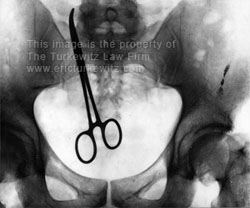
I’ve been reading a lot of medical blogs lately, and medical professionals have been reading mine. And as many doctors have ranted about attorneys (such as those in the comments at Kevin, M.D. and Flea) I’ve noticed a lack of some basic legal principles on the subject of medical malpractice. Many think that any bad result brings on a lawsuit.
Since those misunderstandings no doubt contributed to the rants, this posting serves as a basic primer on the subject. It is based on New York law, but there’s a pretty good chance your own state is similar.
We start with the definition of negligence. (Which I like to define by example: backing out of the driveway without looking.) Here’s the court’s more formal definition that will be given to the jury:
Negligence is lack of ordinary care. It is a failure to use that degree of care that a reasonably prudent person would have used under the same circumstances. Negligence may arise from doing an act that a reasonably prudent person would not have done under the same circumstances, or, on the other hand, from failing to do an act that a reasonably prudent person would have done under the same circumstances.
From there, the court discusses medical negligence. Note the part I placed in bold:
Malpractice is professional negligence and medical malpractice is the negligence of a doctor. Negligence is the failure to use reasonable care under the circumstances, doing something that a reasonably prudent doctor would not do under the circumstances, or failing to do something that a reasonably prudent doctor would do under the circumstances. It is a deviation or departure from accepted practice.
That part in bold is important so as to contrast with what is not malpractice:
By undertaking to perform a medical service, a doctor does not guarantee a good result. The fact that there was a bad result to the patient, by itself, does not make the doctor liable. Doctors are liable only if they are negligent. Whether a doctor was negligent is to be decided on the basis of the facts and conditions existing at the time of the claimed negligence.
Doctors are not liable for errors in judgment if they decide, after careful evaluation, if it is a judgment that a reasonably prudent doctor could have made under the circumstances. If the doctor is negligent, that is, lacks the skill or knowledge required of him or her in providing a medical service, or fails to use reasonable care in providing the service, or fails to exercise his or her best judgment, and such failure is a substantial factor in causing harm to the patient, then the doctor is responsible for the injury or harm caused.
The issue of what constitutes a “deviation from accepted practice” and what constitutes a mere “error in judgment” often frame the testimony and arguments of a trial. The error of judgment defense is so critical that, even if an error was made due to inadvertence, the defense is likely to be that it was done on purpose. Thus, the defense will be that this was merely an error of judgment and the jury shouldn’t engage in Monday morning quarterbacking.
It is also important to note that doctors are not held to the highest standards of knowledge. The jury will be told:
The law recognizes that there are differences in the abilities of doctors, just as there are differences in the abilities of people engaged in other activities. To practice medicine a doctor is not required to have the extraordinary knowledge and ability that belongs to a few doctors of exceptional ability. However doctors are required to keep reasonably informed of new developments in their fields and to practice medicine in accordance with approved methods and means of treatment in general use. A doctor must also use his or her best judgment and whatever superior knowledge and skill he or she possesses, even if the knowledge and skill exceeds that possessed by the average doctor or specialist in the medical community where the doctor practices.
Thus, at any malpractice trial, the plaintiff-patient will have to prove these three things (for which an expert is required):
1. The standard of care is breached with a departure from customary and usual practice, and not a mere error of judgment;
2. That the departure was a substantial cause of injury to the patient;
3. That the injury was very substantial. While those words don’t exist as a legal threshold, they exist as a practical one. One can’t spend hundreds of hours and tens of thousands of dollars to prove a case where the damages don’t cover the time and money put forth. Since the cases are vigorously defended (see: No, Your medical malpractice case will NOT settle early), and defense malpractice attorneys form some of the elite of the trial bar, it would be rare for any attorney who knew what they were doing to take on a smaller case.
I hope to follow up with a post on how malpractice cases are screened and selected.
Addendum:
- 4/25/07 – Medical Malpractice Economics;
- 5/22/07 – Medical Malpractice – Vetting The Case